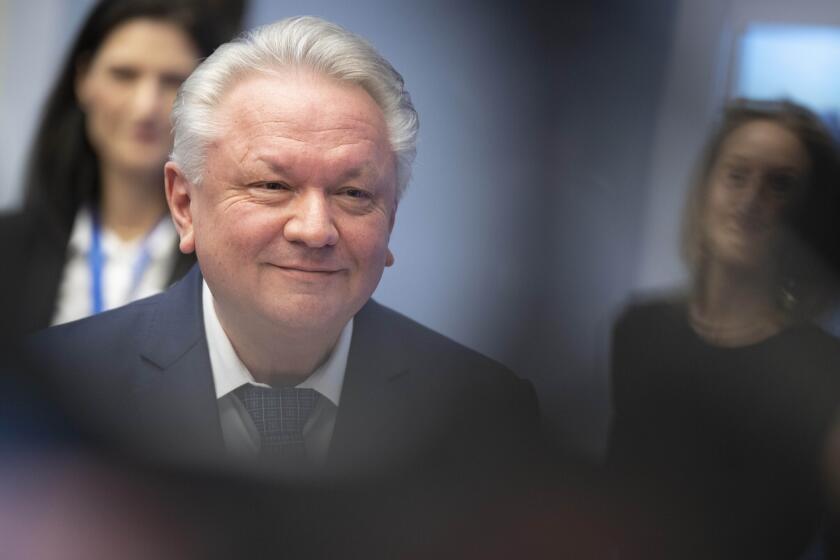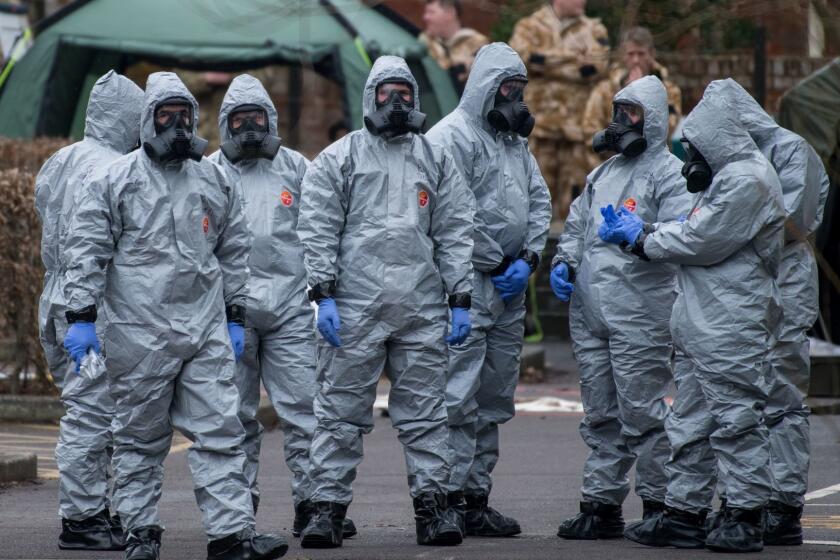Russia and Iran are behind a ‘staggering rise’ in deadly plots, British spy chief says

- Share via
LONDON — Britain is facing a “staggering rise” in attempts at assassination, sabotage and other crimes on its soil by Russia and Iran as the two states recruit criminals to “do their dirty work,” the head of the U.K.’s domestic intelligence agency said.
MI5 Director General Ken McCallum said his agents and police have tackled 20 “potentially lethal” plots backed by Iran since 2022 and warned that it could expand its targets in the U.K. if conflicts in the Middle East deepen.
The spy chief said if the crisis escalates with Israel launching a major attack in response to Iran’s recent missile barrage, there is the risk “of an increase in — or broadening of — Iranian state aggression in the U.K.”
In a rare public speech Tuesday setting out the major threats from both states and militant groups, McCallum said hostile states, radicalized individuals and a revived Islamic State group have combined to create “the most complex and interconnected threat environment we’ve ever seen.”
Western intelligence agencies have uncovered Russian plots to carry out assassinations, arson and other sabotage in Europe against companies and people linked to support for Ukraine’s military.
McCallum said there also is a risk that Israel’s conflicts with Iran-backed militant groups — Hamas in Gaza, Hezbollah in Lebanon and the Houthis in Yemen — could trigger attacks in the U.K., though so far the crisis has not translated “at scale into terrorist violence” in Britain.
The number of state-threat investigations undertaken by MI5 has risen by 48% in the last year, with Iran, Russia and China being the main perpetrators, McCallum told journalists at the U.K.’s counterterrorism command center in London.
McCallum said that since the death of Mahsa Amini — after being detained in September 2022 by Iranian police for allegedly violating a headscarf law — “we’ve seen plot after plot here in the U.K., at an unprecedented pace and scale.”
He said MI5 and the police have responded to 20 potentially lethal Iran-backed plots since January 2022, up from 15 in January.
News that a former Russian spy and his daughter were likely poisoned by a military-grade nerve agent in the British city of Salisbury has spread fears over possible secondary contamination and piqued curiosity about a toxic substance that is as mysterious as it is potentially lethal.
McCallum said Russia’s military intelligence agency was trying to use “arson, sabotage and more” to create “mayhem” on the streets of Britain and other European countries.
Both Russia and Iran often turn to criminals, “from international drug traffickers to low-level crooks,” to carry out attacks, he said.
Several alleged state-backed plots have led to criminal charges. In December a Chechen man was jailed for allegedly carrying out reconnaissance on the offices of a dissident Iranian broadcaster in London. Separately, several suspects are awaiting trial in London over an alleged Russia-linked plan to attack Ukrainian-owned businesses.
Britain is not alone in pointing a finger at Moscow and Tehran. Germany has arrested several people for allegedly spying or planning attacks on behalf of Russia. In May, Sweden’s domestic security agency accused Iran of using criminal networks to target Israeli or Jewish interests in the Scandinavian country.
The British government set up a judicial inquiry Tuesday into the strange death eight years ago of former KGB officer and Russian dissident Alexander Litvinenko, who authorities believe was slipped a lethal dose of radioactive polonium in his tea at a London hotel, possibly at the behest of the Kremlin.
McCallum and other U.K. intelligence chiefs have emphasized China’s increasingly assertive behavior, which McCallum in 2022 called Britain’s greatest “strategic challenge.” On Tuesday, he stressed the importance of U.K.-China economic ties but said there were “risks to be managed.”
The U.K.’s official terrorism threat level stands at “substantial,” the middle of a five-point scale, meaning an attack is likely, and McCallum said that since 2017 authorities have disrupted 43 late-stage militant plots and saved “numerous lives.”
Although about three-quarters of the plots stem from Islamic extremist ideology and a quarter from the extreme right, he said those labels “don’t fully reflect the dizzying range of beliefs and ideologies we see,” drawn from a soup of “online hatred, conspiracy theories and disinformation.” Young people are increasingly involved, he said, with 13% of the subjects of MI5 terrorism investigations under the age of 18.
He also said there were signs that Islamic State is attempting a comeback, despite the collapse of the extremist group’s self-declared caliphate in Iraq and Syria.
As questions swirl over how Wagner boss Yevgeny Prigozhin’s plane crashed, many note that other Kremlin foes have met suspicious and violent ends.
McCallum said that “after a few years of being pinned well back, they’ve resumed efforts to export terrorism,” and cited a March attack that killed more than 140 people at a Moscow concert hall and was claimed by Islamic State, as “a brutal demonstration of its capability.”
MI5 has faced criticism for its failure to stop deadly attacks, including a 2017 suicide bombing that killed 22 people at an Ariana Grande concert in Manchester.
“The first 20 years of my career here were crammed full of terrorist threats,” McCallum said. “We now face those alongside state-backed assassination and sabotage plots, against the backdrop of a major European land war.”
MI5, he said, “has one hell of a job on its hands.”
Lawless writes for the Associated Press. Associated Press writer Jan M. Olsen in Copenhagen contributed to this report.
More to Read
Sign up for Essential California
The most important California stories and recommendations in your inbox every morning.
You may occasionally receive promotional content from the Los Angeles Times.














